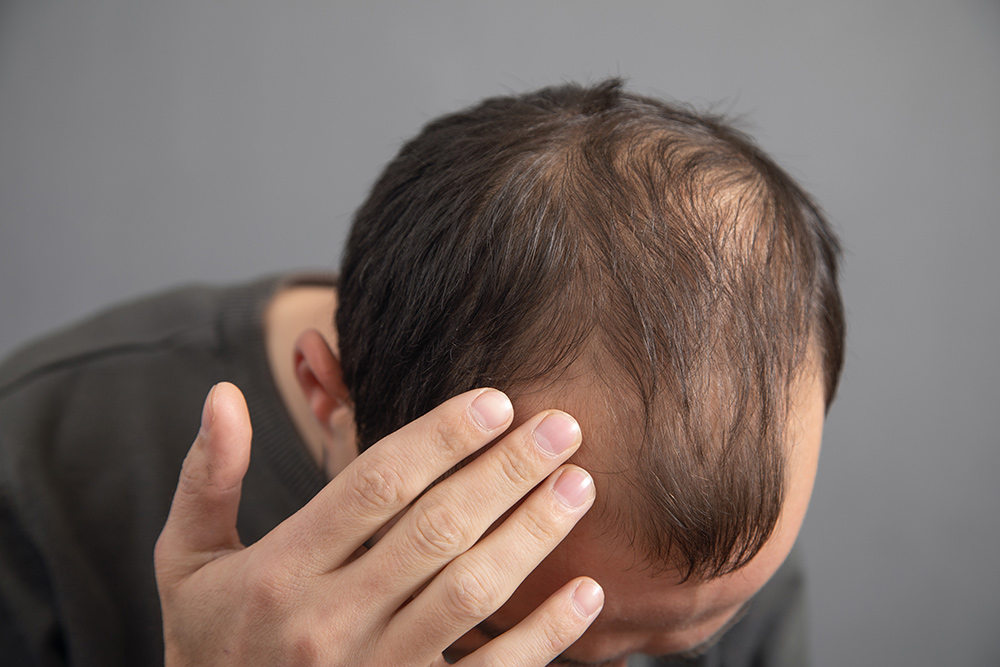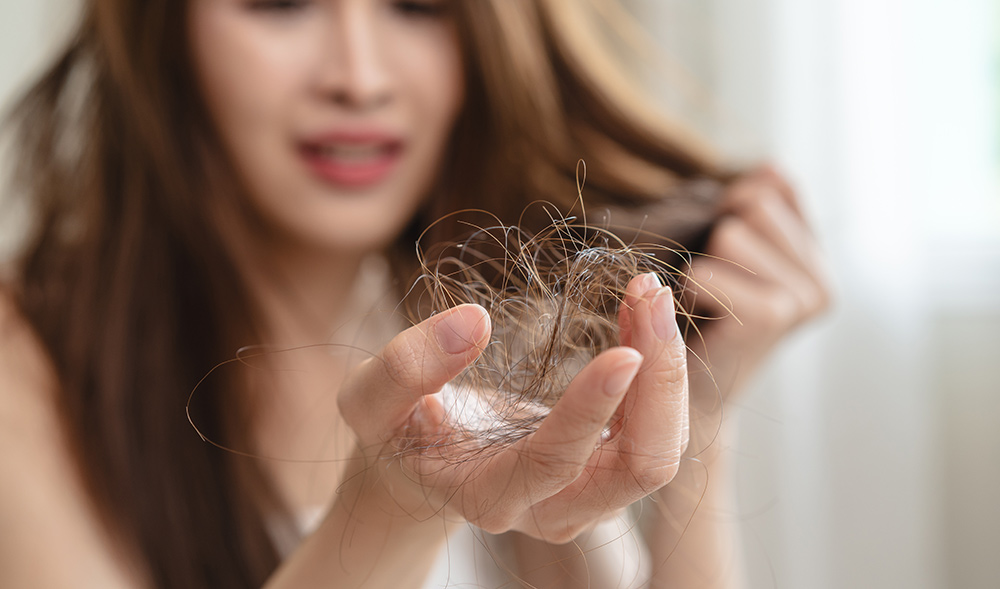Last updated on May 19, 2025
Hair loss can be distressing, especially when it feels sudden or unexplained. If you’re living with diabetes, you might have asked yourself, “Does diabetes cause hair loss?” The short answer is—yes, it can. But there’s more to the story.
In this blog, we’ll explore the link between diabetes and hair loss, the potential role of sugar, and what you can do about it. Whether you’re noticing thinning hair or patchy hair loss, understanding the root cause can help you explore the right treatment options at The Crown Clinic.
Can Diabetes Cause Hair Loss?
So, can diabetes cause hair loss? Yes—and the link between diabetes and hair loss is more common than many people realise. In fact, hair loss is often an early warning sign of metabolic imbalances in the body, particularly in individuals with type 1 or type 2 diabetes.
Here’s how diabetes can contribute to hair thinning or shedding:
1. Poor Circulation
Diabetes can lead to vascular damage, reducing blood flow to the scalp. Since healthy blood circulation is critical for nourishing hair follicles, this lack of oxygen and nutrients may cause the follicles to shrink or become inactive—resulting in weakened strands and increased hair fall.
2. Hormonal Imbalances
Diabetes is a hormonal disorder at its core. When insulin levels fluctuate, it disrupts other hormones in the body that influence the hair growth cycle. This can shorten the anagen (growth) phase and push more hairs into the telogen (resting and shedding) phase prematurely.
3. Autoimmune Factors
Type 1 diabetes is an autoimmune condition, and those affected are more likely to develop other autoimmune disorders—such as alopecia areata. This condition causes patchy hair loss as the immune system mistakenly attacks the hair follicles.
4. Stress, Inflammation & Hair Loss
The psychological and physical stress of managing diabetes—especially if it’s newly diagnosed or poorly controlled—can also contribute to telogen effluvium, a stress-induced form of hair loss. High cortisol levels, common in people under prolonged stress, may further impair follicle health.
Moreover, chronic inflammation—a common issue in people with insulin resistance—can damage hair follicles over time and make it harder for healthy new hairs to grow.

Common signs of hair loss from diabetes can include gradual thinning across the scalp and bald spots.
What Hair Loss from Diabetes Looks Like
Hair loss caused by diabetes may present differently for each individual, depending on how well their condition is managed and how long they’ve had it. Common signs include:
- Gradual thinning across the scalp
- Bald spots, especially around the crown or part line
- Slow or limited hair regrowth, or hair that breaks easily
- Body and facial hair loss in more advanced or uncontrolled cases
You may also notice a change in your hair’s texture—becoming finer, more brittle, or lacking in volume. In some people, hair may shed in larger amounts during brushing or washing, or it may take noticeably longer to grow back after it falls out.
Hair loss may be temporary, especially if it’s linked to stress, medication, or a sudden change in blood sugar. In other cases, it can become progressive, particularly when circulation or follicle health deteriorates over time.
Natural Ways to Support Hair Growth with Diabetes
A healthy lifestyle and diet can support your results and protect against further shedding. Here are some natural strategies:
Balanced, Nutrient-Rich Diet
Eating foods rich in biotin, iron, zinc, vitamin D, and omega-3 fatty acids can help strengthen hair follicles and promote growth. Leafy greens, eggs, salmon, nuts, seeds, and legumes are all great choices.
Stable Blood Sugar Levels
Keeping your blood glucose under control helps reduce inflammation and hormonal fluctuations that impact hair health. This also improves circulation—allowing your scalp to receive the nutrients it needs.
Hydration & Scalp Care
Drinking plenty of water and maintaining a clean, healthy scalp can improve follicle function and reduce buildup that may clog pores.

If you’re dealing with hair loss from diabetes, there are a few hair restoration options for you to consider.
Hair Restoration Options at The Crown Clinic
Hair loss doesn’t have to be permanent. At The Crown Clinic, we offer a wide range of hair restoration solutions designed to suit your needs.
Hair Transplant Surgery
We specialise in multiple advanced hair transplant techniques, including:
- FUE (Follicular Unit Extraction): A minimally invasive method that extracts and implants individual hair follicles for natural-looking, long-lasting results.
- CPI Direct Hair Implantation: A refined technique where extracted grafts are implanted directly without creating slits, allowing for precise placement and density.
- Sapphire Hair Transplant: Uses sapphire blades for greater precision and faster healing, ideal for those seeking a more refined aesthetic result.
Non-Surgical Hair Loss Treatments
If you’re not ready for surgery or are in the early stages of hair loss, we also offer:
- Growth Factor Therapy: A regenerative treatment that stimulates hair follicles, enhances scalp health, and encourages stronger, healthier regrowth.
- Scalp Micropigmentation (SMP): A cosmetic tattooing technique that replicates the appearance of hair follicles to improve the look of thinning areas or scars.
- Medications & Hair Loss Products: We provide medical-grade hair care products and medications designed to stabilise shedding, support follicle health, and promote regrowth.
Each treatment plan is customised to your needs and preferences. During your consultation, our expert team will walk you through your options and help you choose the best path forward.
Book a Free Hair Consultation
Worried about diabetes-related hair loss or noticing changes in your hair that concern you? You should first visit your GP if you have any health concerns that have not been diagnosed.
At The Crown Clinic, we bring over 50 years of experience in hair restoration and offer a truly personalised, doctor-led approach to treatment. Whether you’re exploring FUE hair transplantation or non-surgical options, our expert team will take the time to understand your medical history, hair loss concerns, and goals—so we can recommend a solution that works for you.
Call us on +61 2 9134 4788 or book a free consultation here.
FAQs
Does diabetes cause hair loss in both men and women?
Yes. Both men and women with diabetes can experience hair loss due to factors like poor circulation, hormonal imbalances, or autoimmune responses. While the pattern may differ between genders, the underlying mechanisms can affect anyone managing the condition.
Can hair loss from diabetes be reversed?
In many cases, yes—especially if the underlying diabetes is well-managed and addressed early. Combining stable blood sugar control with targeted hair restoration treatments may significantly improve outcomes over time.
Is a hair transplant safe if I have diabetes?
Yes, a FUE hair transplant is safe for individuals with well-controlled diabetes, as long as proper precautions are taken. It is essential you have the condition diagnosed by your personal GP. At The Crown Clinic, we carefully review your medical history and work closely with you to ensure a safe and tailored treatment experience.
Does sugar cause hair loss?
While sugar doesn’t directly cause hair loss, a high-sugar diet can lead to inflammation, insulin resistance, and hormonal disruptions that negatively impact hair health. Managing your sugar intake can support both your scalp condition and your overall wellbeing.
What are the best hair loss treatments for people with diabetes?
The best treatments depend on the severity and pattern of your hair loss, but options like FUE hair transplants, growth factor therapy, and scalp micropigmentation can be highly effective. At The Crown Clinic, we personalise each plan to suit your hair restoration goals and health profile.
General Information Disclaimer: This information is not intended to be used for diagnosis or treatment. It is aimed at presenting a perspective only and is not a substitute for a prescription. Anyone experiencing a medical condition should consult their doctor.